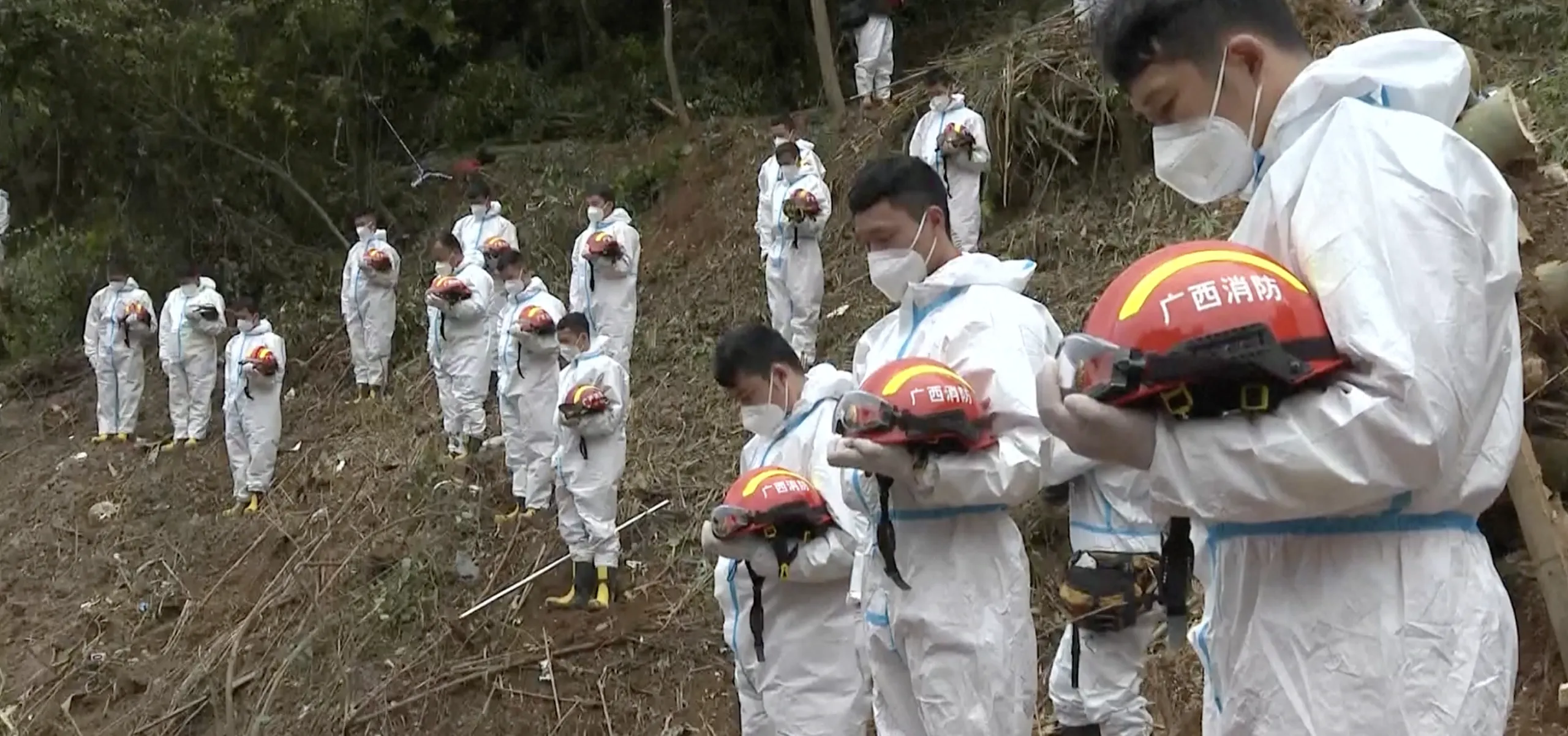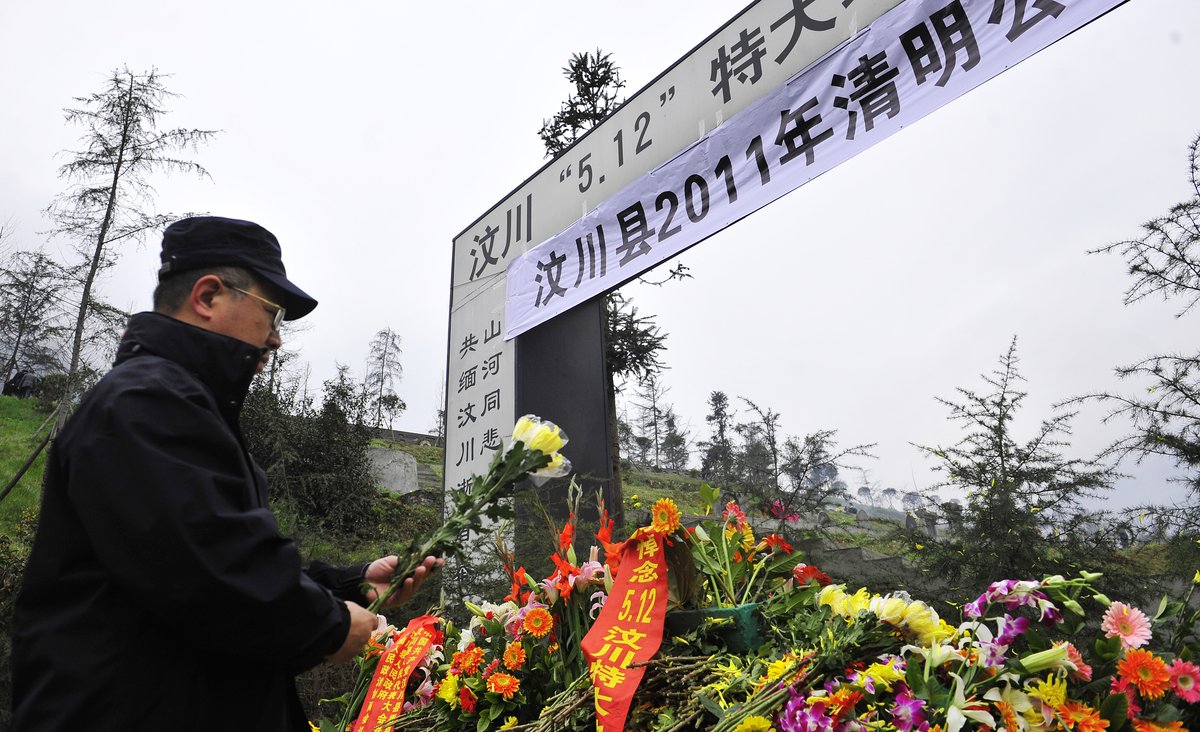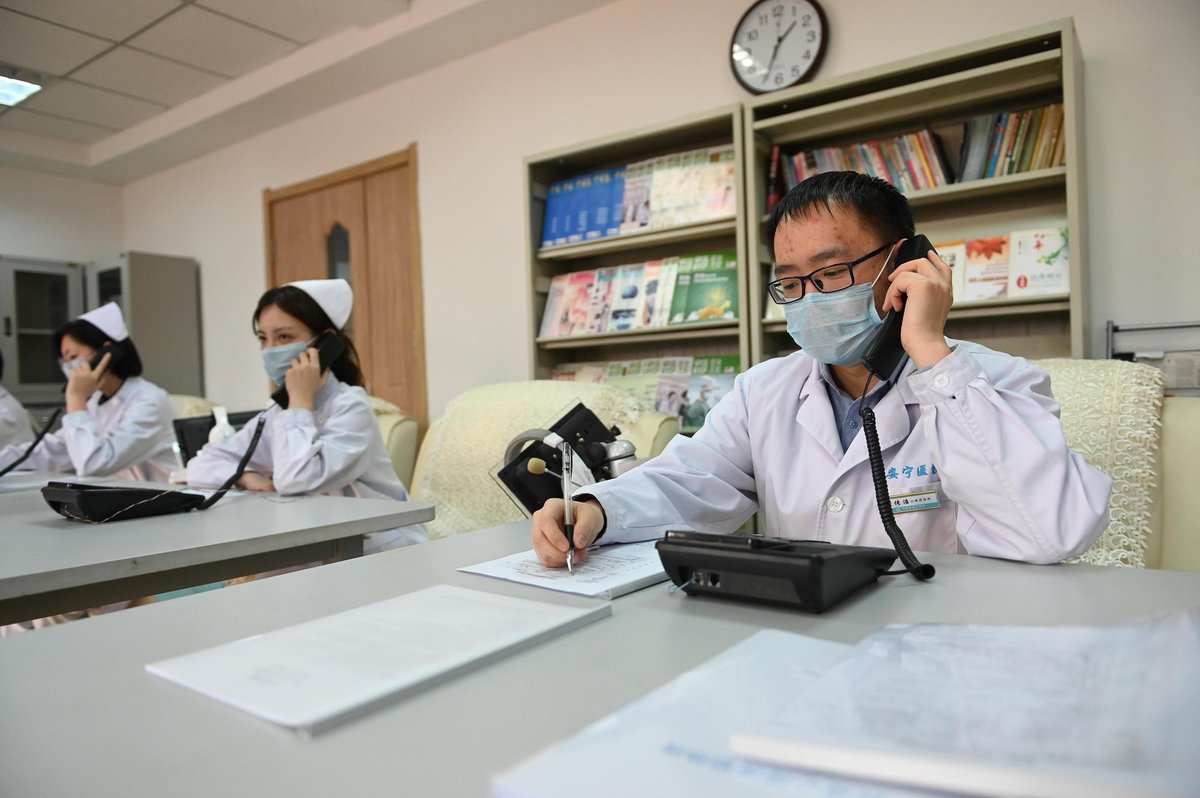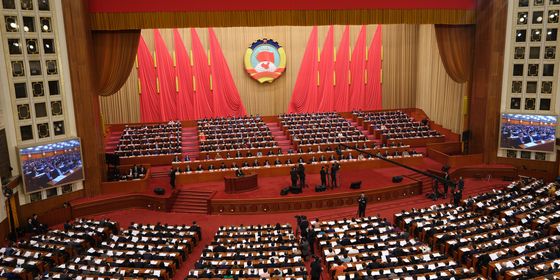The aftermath of the MU5735 air crash brings attention to the need of long-term psychological support for victims of disasters and their families
Half an empty suitcase, mud-tainted garments burned to shreds, a part of a national ID card with the owner’s face still visible…In the rainy mountains of Tengxian county, Guangxi, emergency rescue teams are still picking up haunting remnants of the 132 people who perished when China Eastern Airlines flight MU5735 crashed on March 21, 2022.
“Our hearts were very heavy,” a 24-year-old rescue worker and Tengxian government worker, identified by the pseudonym Zhou Fei, told The Paper. “Somebody [at the rescue site] said, ‘don’t look [at these things] anymore, don’t look anymore…’”
The disaster sparked an outpouring of grief around the country, but also spurred discussion about the psychological aftermaths of traumatic events, as well as challenges for helping people heal from trauma. As no hope is left for finding survivors, disaster response from the MU5725 crash has shifted to providing psychological assistance to all affected, including rescue workers like Zhou and relatives of the deceased.
A press release via the state-run Xinhua News Agency on March 31 stated that a national emergency task force, headed by the Civil Aviation Administration, has provided temporary shelter to 695 family members and friends of the deceased, and offered a total of 7,926 psychological evaluations and 2,917 counseling appointments, including individual and group sessions. However, the press release did not specify how long they plan to continue the service, and long-term psychological support for trauma victims remains a work-in-progress in China.
In China, psychological crisis intervention came into the public agenda after the Wenchuan Earthquake in Sichuan province in 2008, which killed 69,227 people and left hundreds of thousands more injured or missing. After the quake, coordinated (albeit frenzied) psychological aid flooded into Sichuan.
Some survivors, who were asked to fill out survey after survey by different teams of inexperienced psychologists, found the process intrusive. However, as a TWOC investigation of the psychological aftershocks of the quake learned in 2020, other volunteers and mental health professionals in Wenchuan initiated China’s first programs for community-based psychological counseling (which was previously restricted to hospital settings) and adapted Western psychiatry to local and ethnic minority culture, setting precedents for future psychological aid in China.
Today, there are hospitals in China offering training dedicated to crisis intervention “often based on precedents accumulated through the disaster relief practices in China,” Chen Zhengxin, a psychiatrist at one such training program, offered by the Zhejiang Mental Health Center at the Tongde Hospital in Hangzhou, shares with TWOC. Many psychological aid teams formed in Sichuan in 2008 went on to serve the victims of the 2010 Qinghai Earthquake, the 2010 Gansu mudslide, the 2015 Tianjin port explosions, and a 2018 knife attack in Shaanxi, as TWOC noted in 2020.
Shi Jianfei, deputy director of the psychological crisis intervention committee at the Chinese Association for Mental Health, a professional organization, told TWOC over the phone that in his province of Zhejiang in east-central China, “Every city has set up a psychological crisis intervention working team through its public hospital systems.” In non-disaster times, these teams are sometimes dispatched to provide psychological interventions in other contexts, such as to people who are having a hard time in Covid-19 quarantines.
But getting long-term treatment, or even getting diagnosed, can still be a struggle for people who experience traumatic events. Suo Peng, a psychotherapist who spent three years providing interventions after the 2008 quake in Mianzhu, Sichuan province, told the Beijing News that the public enthusiasm toward mental health usually dies down a month after a disaster. “Mental health professionals are seldom able to follow up with an individual for a year,” she said. Shi tells TWOC that many mental health workers dispatched in emergency situations have full-time jobs in hospitals, making it hard for them to follow up with disaster victims after the immediate crisis has passed.
The 2020 TWOC report notes that a study surveying 5,000 survivors 30 years after the 1975 earthquake in Tangshan, Hebei province, found that 70 percent still suffered from problems like post-traumatic stress disorder (PTSD), anxiety, and depression. “Some treatments for PTSD or delayed-onset PTSD is covered by the public medical insurance,” Shi says, “but other than that, there is not currently a system to insure [people who suffer from trauma long-term].”
Currently, hospitals in China often rely on diagnostic standards from the World Health Organization or the American Psychiatric Association for trauma-related disorders. For patients diagnosed with PTSD, according to Chen, treatment commonly consists of medications for depression, anxiety, and sleep problems. “We rarely give out a trauma-related diagnosis because it needs to be caused by severe events, which are statistically uncommon in everyday life,” he says.
Complicating attempts to expand services to PTSD sufferers is the fact that “everyone is different in how sensitive they are to certain events,” Shi says. He believes that many people who suffer from trauma fall through the cracks, as the diagnostic evaluations fail to take into account the different ways individuals can respond to harrowing experiences.
The field of trauma-related psychological studies and practice is still in its infancy in China. Wu Chen, a psychotherapist and oral historian who has worked with young Cambodians on the legacy of Khmer Rouge and with Syrian refugees in Europe, notes that when she practiced as a counselor in China in 2011, she could not find many trauma-specific resources to recommend to her patients. In 2020, when she returned to China from studying abroad, it was also almost impossible for Wu to find a trauma-specialized clinic to work at, or even individual therapists systematically trained in treating trauma.
For those whose traumatic experience would fit into a standardized diagnosis like PTSD, getting treatment relies on the patient making a connection between their current symptoms and the traumatic event, as well as willingness to come forward. “Few are willing to admit their mental health conditions,” says Wu. Shi says that culture plays a big role, “They see this as taboo, afraid it might affect their career, or simply feel embarrassed.”
A 30-year-old woman from east-central China, who preferred to be known as Erica, tells TWOC over WeChat she suffered PTSD symptoms after surviving the 2015 earthquake in Nepal. She has never sought professional help because she felt she could handle it herself, and “talking about it is like ripping open a wound over and over again. It hurts too much.”
After the air crash in Guangxi, she shared her experiences on her own public WeChat account: flashbacks to the event, hypervigilance, numbness or avoidance, and claustrophobia. Even now, “while writing this paragraph, my stomach and intestines start to ache,” she states in her message to TWOC.
Among Chinese patients who do come forward to seek help, they are more likely to express psychological problems through somatic descriptions, Wu observes. “They usually don’t tell you that they feel depressed, like people do in the West. They say, ‘There is a tightness in my chest. I can’t breathe.’” She also notes from her experience that Chinese patients are less willing to tell their life stories to a stranger, but are more likely to expect psychological intervention to lead to tangible improvements to their symptoms.
The Seventh People's Hospital of Hangzhou, a hospital specialized in psychiatry where Shi works, was renamed “Center for Sleep Disorders” in 2011. In Shi’s view, this made it easier for Chinese patients, including those who’ve experienced trauma, to seek help. He claims that the number of visitors to the hospital increased after the name-change: “[People were willing to] come in just for sleep problems. But they end up discovering deeper issues, and opportunities for treatment.”
The general public’s lack of understanding of PTSD and psychological treatment also results in social stigma for sufferers. After the MU5735 crash, some relatives of victims who appeared in media interviews or posted memorials to their deceased loved ones on social media with bullying from netizens who felt their reactions were attention-seeking and “not sad enough.”
Wu wishes to see in China not just more public awareness of trauma, but “trauma-informed systems” where all parties involved, from service providers to law enforcement to policy makers, recognize and know how to respond to individuals in traumatic stress.
In the aftermath of the MU5735 crash, Erica has decided to write down her own experiences as a way of coping, “and if possible, provide something for others to learn from,” she tells TWOC.
But she still feels reluctant to seek help herself. “There are some things you can seek external help for, and they help to an extent, but more of the fight should come from yourself,” she believes.














